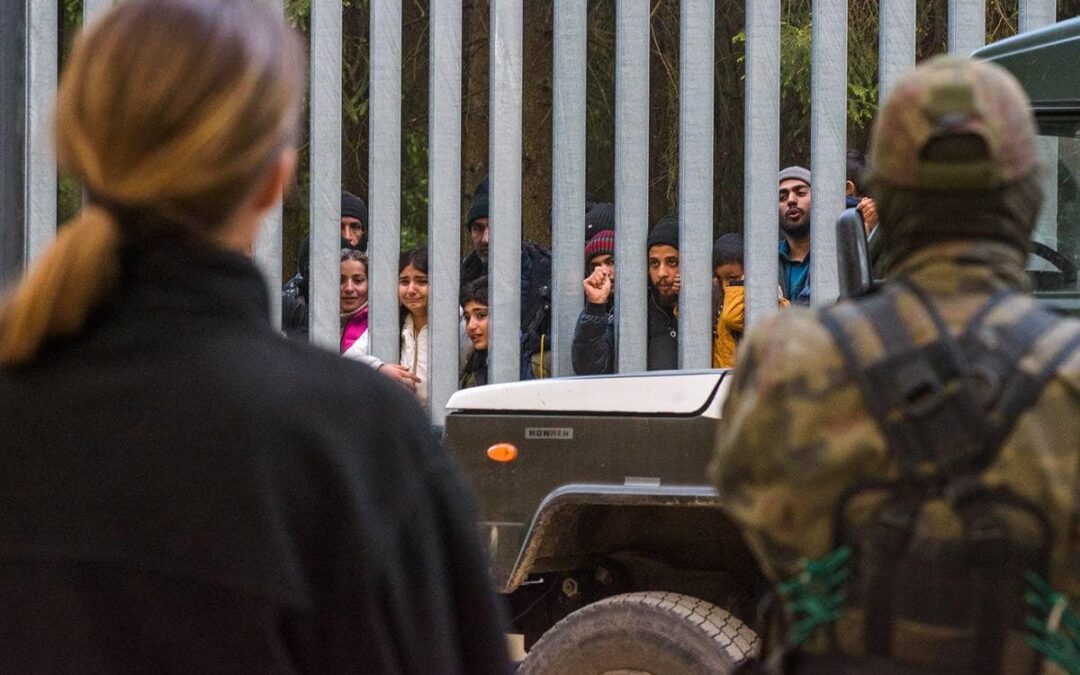A group of 25 Syrian and Iraqi asylum seekers – 11 of them children, one as young as two years old – are “trapped” on the Polish-Belarusian border, having faced violence in Belarus but unable to enter Poland, according to activists. Poland’s human rights office has visited the group to ascertain their status.
On Saturday, Grupa Granica, an activist organisation that provides humanitarian, medical and legal support to people trying to cross the border, reported that the asylum seekers have been stuck there for days.
Pictures show the group behind the wall that Poland built last year in response to attempted crossings by thousands of people, mainly from the Middle East, Asia and Africa, orchestrated by the Belarusian authorities.
Grupa Granica says that, though they are behind the fence, the asylum seekers are already on Polish territory. It claims one of the men has been beaten by Belarusian officials while one woman was bitten by dogs, and both are in need of medical attention.
The group told Grupa Granica that the Belarusian authorities have threatened to set dogs on them if they try to turn back rather than cross into Poland, where they want to claim asylum.
None of their claims have yet been publicly verified and confirmed. However, the office of Poland’s commissioner for human rights yesterday sent two representatives to check on the group and has also been in communication with the border guard.
One of those representatives, Maciej Grzeskowiak, spoke to the media yesterday, but said he was unable to reveal specific details about the group. However, the commissioner’s office confirms they are “most likely on the territory of Poland”.
28.05 w miejscu,gdzie przebywają cudzoziemcy, pojawili się nacz. Wydz. Praw Migrantów i Mniejszości Narodowych A.Szmajdzińska i gł. koordynator M.Grześkowiak. Celem ich wizyty było osobiste zweryfikowanie sytuacji cudzoziemców, także pod względem udzielanej im pomocy humanitarnej
— Biuro Rzecznika Praw Obywatelskich (@BiuroRPO) May 28, 2023
A Polish activist at the site, Dominika Ożyńska, told news website Onet that Polish border guards had prevented people from approaching the border to provide aid to the asylum seekers but said she had seen officers handing out food and water themselves to the group.
“Two of the Syrian families lost their homes in the recent earthquake, so they have nothing to return to,” said Ożyńska. She noted that Poland has a legal obligation to consider requests for asylum. Grzeskowiak also told the media that Poland “should accept such applications for international protection”.
The border guard has not yet publicly commented on the situation and did not respond to requests from several media outlets. Previously, the Polish and German authorities noted that many of those illegally crossing from Belarus do not seek asylum in Poland but instead travel onwards to western Europe, especially Germany.
In response to an opposition MP criticising the authorities for not helping the group, deputy interior minister Maciej Wąsik tweeted that they are “migrants, not refugees” and “want to cross the border illegally”. He said that the border guard was doing its job by protecting the border.
A court has ruled that the Polish border guard violated the law when sending a group of Yemenis and Iraqis back over the border to Belarus after they crossed into Poland.
It is the second recent ruling to have found such "pushbacks" to be illegal https://t.co/k6SCjbKt8x
— Notes from Poland 🇵🇱 (@notesfrompoland) May 30, 2022
In the summer of 2021, thousands of migrants and asylum seekers began trying to cross into Poland from Belarus. They were encouraged and assisted in doing so by the Belarusian authorities, in what the Polish government and EU called a “hybrid action”.
In response, Poland last year constructed a wall and electronic monitoring system along the border, which has contributed to a significant decline in the number of irregular crossings.
However, human rights groups note that a humanitarian crisis continues at the border, where many migrants are still trying to cross. Grupa Granica has recorded 45 deaths at the border since the crisis began, with the most recent body discovered last week in the Świsłocz river that runs along the border.
A young Sudanese man who drowned in a river on Poland’s border while trying to cross from Belarus has been buried in a funeral organised by the local Muslim community.
He is one of at least 20 to have died at the border since last year https://t.co/TDWdwp8DHa
— Notes from Poland 🇵🇱 (@notesfrompoland) December 6, 2022
Main image credit: Grupa Granica/Facebook

Daniel Tilles is editor-in-chief of Notes from Poland. He has written on Polish affairs for a wide range of publications, including Foreign Policy, POLITICO Europe, EUobserver and Dziennik Gazeta Prawna.




















